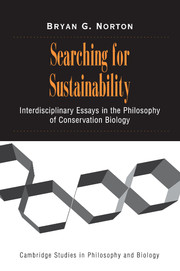Book contents
- Frontmatter
- Contents
- Searching for Sustainability
- General Introduction: An Interdisciplinary Experiment
- I PRAGMATISM AS AN ENVIRONMENTAL PHILOSOPHY
- II SCIENCE, POLICY, AND POLICY SCIENCE
- III ECONOMICS AND ENVIRONMENTAL SUSTAINABILITY
- IV SCALING SUSTAINABILITY: ECOLOGY AS IF HUMANS MATTERED
- V SOME ELEMENTS OF A PHILOSOPHY OF SUSTAINABLE LIVING
- VI VALUING SUSTAINABILITY: TOWARD A MORE COMPREHENSIVE APPROACH TO ENVIRONMENTAL EVALUATION
- Index
V - SOME ELEMENTS OF A PHILOSOPHY OF SUSTAINABLE LIVING
Published online by Cambridge University Press: 21 January 2010
- Frontmatter
- Contents
- Searching for Sustainability
- General Introduction: An Interdisciplinary Experiment
- I PRAGMATISM AS AN ENVIRONMENTAL PHILOSOPHY
- II SCIENCE, POLICY, AND POLICY SCIENCE
- III ECONOMICS AND ENVIRONMENTAL SUSTAINABILITY
- IV SCALING SUSTAINABILITY: ECOLOGY AS IF HUMANS MATTERED
- V SOME ELEMENTS OF A PHILOSOPHY OF SUSTAINABLE LIVING
- VI VALUING SUSTAINABILITY: TOWARD A MORE COMPREHENSIVE APPROACH TO ENVIRONMENTAL EVALUATION
- Index
Summary
In this book the idea of sustainability has been observed from a number of disciplinary perspectives, which have functioned as a sort of intellectual house of mirrors – reflecting and refracting the idea of sustainability through lenses provided by philosophical pragmatism, policy science, economics, and ecology. This part includes three papers that look at the core idea of sustainable living, surveying some of the substantive issues that must be faced if we are to articulate a consistent and practically possible moral guide to sustainable living. Full success at such a task will require solutions to many puzzling moral and conceptual problems; the essays included here address a few of the perplexing questions that have to be clarified and resolved if we are to articulate a coherent approach to sustainable living.
One difficult problem in making sustainable choices is to clarify our moral relations to other species that, whatever else we save, seem deserving of our careful husbandry. Herein lies an apparent paradox, however, having to do with our relations to wild animals. On the one hand, we are responsible for the decimation of historic populations of many species. Recognizing these impacts, thoughtful and caring people – in zoos, aquariums, and in other wildlife facilities – have undertaken heroic efforts to save particular species from extinction through captive breeding programs. These efforts, however, often require serious invasions of the autonomy and well-being of individual members of those species.
- Type
- Chapter
- Information
- Searching for SustainabilityInterdisciplinary Essays in the Philosophy of Conservation Biology, pp. 373 - 374Publisher: Cambridge University PressPrint publication year: 2002



